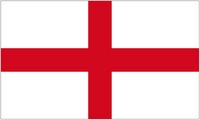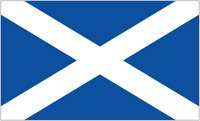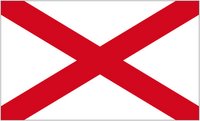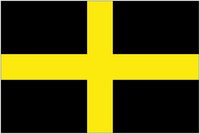I Pledge Allegiance to the Flag ...
One interesting thing about life in the US, is how many US flags one sees. I think that we British are just as patriotic, but are quite content to be quietly patriotic. The flags only come out for special occasions. In fact, recently, the World Cup clashed with the Queen's Golden Jubilee. I think that there were probably more England flags around Birmingham than there were Union Jacks. Does this mean that we are more patriotic/passionate about our football than we are about our Royal family?
The status quo was rocked the other week when a boy who had only recently moved to the US refused to say the Pledge of Allegiance. (I must say before I continue that this account is as told by my children, so if I discover that there are any inaccuracies, I'd be happy to correct them.) I dare say that his allegiance was probably to the flag of his home country. After some deliberation, the school decided that all American children must stand and recite the Pledge, but that non-Americans, although they should stand with the rest of the class, need not put their hand on their heart or recite the Pledge.
America is built on immigration. Non-Americans move to America and become Americans. They become Irish-Americans, Greek-Americans, Mexican-Americans (you can continue this list with prefixes that cover pretty much any country you may choose). As a non-resident alien, my allegiance is currently firmly to the United Kingdom of Great Britain and Northern Ireland. However, the US is currently our host country and, if we live here for a number of years, my children are likely to grow up becoming just as much American as they are British (Anglo-American?).
I told my daughter (whose class this entire affair concerns) that she can choose what she wants to do. If she wants to say the Pledge of Allegiance, I don't mind; but I also don't mind if she doesn't want to.
The Union Jack
It has occurred to me that some people might not have an understanding of the difference between the England flag and the Union Jack.The Union Jack is made up of:
St. George's Cross for England (Source):

St Andrew's Saltire for Scotland (Source):

St. Patrick's Cross for Ireland (Source):

These three flags are superimposed to form the Union Jack. The Union Jack represents the whole of the United Kingdom, so would be flown in such events as the celebration of the Queen's Golden Jubilee. St. George's Cross, however, is the flag of England, so would be flown to show support for the England team in the World Cup.
I don't want to leave out the Welsh, so here's St. David's Cross (even though it doesn't feature in the Union Jack) (Source):






5 comments:
As a Canadian who has lived beside the US for most of his life, I appreciated this post in a way beyond your intention. Canadians also "are just as patriotic [as Americans], but are quite content to be quietly patriotic."
Thanks for taking it easy on us. We catch alot of flack for our pledge. I kind of like the tradition (especially the part about pledging allegiance to "the republic for which [the flag] stands"), but certainly don't think that other countries who don't have a similar tradition have less patriotic people.
Thank you very much for the explanation of the Union Jack. I didn't know that.
Not to say that there weren't flags all over the place already, but the attack on Sept 11, 2001 brought about a marked increase in the display of flags.
My niece, who has dual U.S./Canadian citizenship, but resides in the U.S., had her preschool graduation today. During the graduation, she held the Stars and Stripes while her classmates recited the pledge. Everyone in attendance was standing quietly with their hands over their hearts listening to the children when her father (my brother-in-law), who is Canadian, leaned toward my wife and loudly said to her, "What are you supposed to do if you're Canadian? I'm not saying the pledge." She sharply shushed him and went back to listening to the pledge. He was quite offended, but not as offended as she was for the disrespect he showed during a pledge of allegiance to the country in which he chooses to live. She didn't expect him to say the pledge, or to put his hand over his heart, but he should have stood quietly and allowed others to do so.
Post a Comment